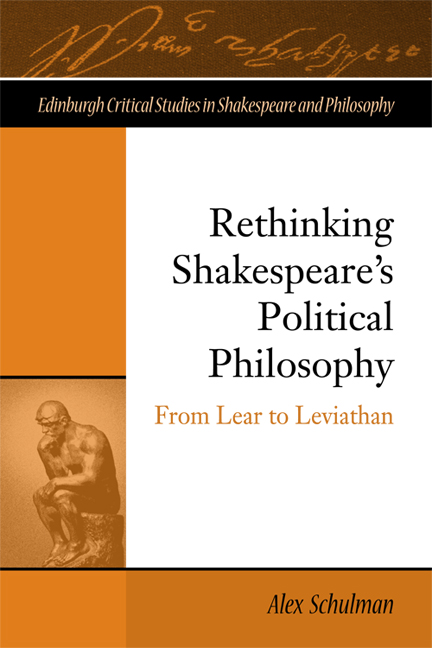Book contents
- Frontmatter
- Contents
- Acknowledgements
- Abbreviations
- Series Editor's Preface
- Introduction
- I SHAKESPEAREAN ANTIQUITY
- II SHAKESPEAREAN MODERNITY
- 3 King Lear and the State of Nature
- 4 Shakespeare's Novus Ordo Seclorum: Freedom and Authority in the English Histories
- 5 Shakespeare and the Theological'Political Problem
- Epilogue: Brave New Worlds
- Notes
- Index
5 - Shakespeare and the Theological'Political Problem
from II - SHAKESPEAREAN MODERNITY
Published online by Cambridge University Press: 05 August 2016
- Frontmatter
- Contents
- Acknowledgements
- Abbreviations
- Series Editor's Preface
- Introduction
- I SHAKESPEAREAN ANTIQUITY
- II SHAKESPEAREAN MODERNITY
- 3 King Lear and the State of Nature
- 4 Shakespeare's Novus Ordo Seclorum: Freedom and Authority in the English Histories
- 5 Shakespeare and the Theological'Political Problem
- Epilogue: Brave New Worlds
- Notes
- Index
Summary
Christ and the apostles wanted to be and were continuously subject in property and in person to the coercive jurisdiction of secular rulers … The coercive judicial power of Pilate over the person of Christ … was from God.
Marsilius of PaduaThere is … a kind of profession of faith which the laws may impose … because there can exist Religions that attack the foundations of society, and one has to begin by exterminating these Religions in order to insure the peace of the State. I would wish, then, that in every State there were a moral code, or a kind of civil profession of faith, containing, positively, the social maxims everyone would be bound to acknowledge, and, negatively, the fanatical maxims one would be bound to reject, not as impious, but as seditious. Thus every Religion that could conform to the code would be allowed; every Religion that did not conform to it would be proscribed; and everyone would be free to have no other Religion than the code itself.
Rousseau to VoltaireJust as Shakespeare weaves the birth of Christianity into his Roman plays, he weaves conflict over the secularisation of politics prompted by Renaissance humanism and Protestantism into two plays that hinge on the nature of contract and bond(age). The traditionalism of the Judaic covenant, represented by The Merchant of Venice's Shylock, clashes with the Venetian commercial–political order that had previously accommodated it. Measure for Measurerevolves around disturbances of entrepreneurial holiness represented by the conflict between Angelo and Isabella. This continues my general account of the rise of secular nationalism, and political professionalism, out of a struggle between its representatives and opponents with anti- or suprapolitical values. Here the victors are Merchant's Portia, who expropriates Shylock's estate by disguising herself as a loophole-hunting litigator, and Measure's Duke, who manages the threat of Vienna coming apart due to erotic and thanatotic extravagances by incorporating Angelo, Isabella and others into matrimonial institutions.
Contemporary resurgences of religious fundamentalism have reinvigorated examination of the ‘theological–political problem’, which has, Steven Smith explains, ‘two dimensions: Should religion rule politics, or should politics rule religion?’ In the West, this originates in Christianity's peculiar history.
- Type
- Chapter
- Information
- Rethinking Shakespeare's Political PhilosophyFrom Lear to Leviathan, pp. 156 - 195Publisher: Edinburgh University PressPrint publication year: 2014



